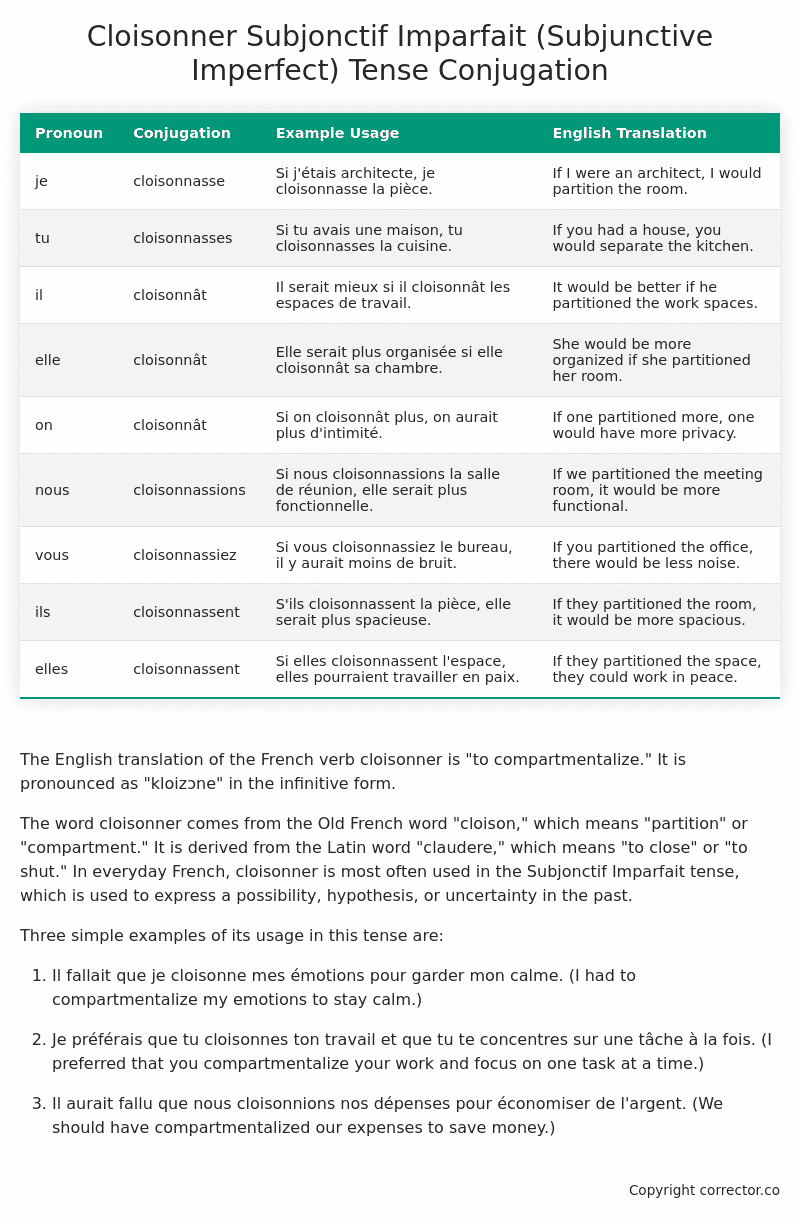Subjonctif Imparfait (Subjunctive Imperfect) Tense Conjugation of the French Verb cloisonner
Introduction to the verb cloisonner
The English translation of the French verb cloisonner is “to compartmentalize.” It is pronounced as “kloizɔne” in the infinitive form.
The word cloisonner comes from the Old French word “cloison,” which means “partition” or “compartment.” It is derived from the Latin word “claudere,” which means “to close” or “to shut.” In everyday French, cloisonner is most often used in the Subjonctif Imparfait tense, which is used to express a possibility, hypothesis, or uncertainty in the past.
Three simple examples of its usage in this tense are:
-
Il fallait que je cloisonne mes émotions pour garder mon calme. (I had to compartmentalize my emotions to stay calm.)
-
Je préférais que tu cloisonnes ton travail et que tu te concentres sur une tâche à la fois. (I preferred that you compartmentalize your work and focus on one task at a time.)
-
Il aurait fallu que nous cloisonnions nos dépenses pour économiser de l’argent. (We should have compartmentalized our expenses to save money.)
Table of the Subjonctif Imparfait (Subjunctive Imperfect) Tense Conjugation of cloisonner
| Pronoun | Conjugation | Example Usage | English Translation |
|---|---|---|---|
| je | cloisonnasse | Si j’étais architecte, je cloisonnasse la pièce. | If I were an architect, I would partition the room. |
| tu | cloisonnasses | Si tu avais une maison, tu cloisonnasses la cuisine. | If you had a house, you would separate the kitchen. |
| il | cloisonnât | Il serait mieux si il cloisonnât les espaces de travail. | It would be better if he partitioned the work spaces. |
| elle | cloisonnât | Elle serait plus organisée si elle cloisonnât sa chambre. | She would be more organized if she partitioned her room. |
| on | cloisonnât | Si on cloisonnât plus, on aurait plus d’intimité. | If one partitioned more, one would have more privacy. |
| nous | cloisonnassions | Si nous cloisonnassions la salle de réunion, elle serait plus fonctionnelle. | If we partitioned the meeting room, it would be more functional. |
| vous | cloisonnassiez | Si vous cloisonnassiez le bureau, il y aurait moins de bruit. | If you partitioned the office, there would be less noise. |
| ils | cloisonnassent | S’ils cloisonnassent la pièce, elle serait plus spacieuse. | If they partitioned the room, it would be more spacious. |
| elles | cloisonnassent | Si elles cloisonnassent l’espace, elles pourraient travailler en paix. | If they partitioned the space, they could work in peace. |
Other Conjugations for Cloisonner.
Le Present (Present Tense) Conjugation of the French Verb cloisonner
Imparfait (Imperfect) Tense Conjugation of the French Verb cloisonner
Passé Simple (Simple Past) Tense Conjugation of the French Verb cloisonner
Passé Composé (Present Perfect) Tense Conjugation of the French Verb cloisonner
Futur Simple (Simple Future) Tense Conjugation of the French Verb cloisonner
Futur Proche (Near Future) Tense Conjugation of the French Verb cloisonner
Plus-que-parfait (Pluperfect) Tense Conjugation of the French Verb cloisonner
Passé Antérieur (Past Anterior) Tense Conjugation of the French Verb cloisonner
Futur Antérieur (Future Anterior) Tense Conjugation of the French Verb cloisonner
Subjonctif Présent (Subjunctive Present) Tense Conjugation of the French Verb cloisonner
Subjonctif Passé (Subjunctive Past) Tense Conjugation of the French Verb cloisonner
Subjonctif Imparfait (Subjunctive Imperfect) Tense Conjugation of the French Verb cloisonner (this article)
Subjonctif Plus-que-parfait (Subjunctive Pluperfect) Tense Conjugation of the French Verb cloisonner
Conditionnel Présent (Conditional Present) Tense Conjugation of the French Verb cloisonner
Conditionnel Passé (Conditional Past) Tense Conjugation of the French Verb cloisonner
L’impératif Présent (Imperative Present) Tense Conjugation of the French Verb cloisonner
L’infinitif Présent (Infinitive Present) Tense Conjugation of the French Verb cloisonner
Struggling with French verbs or the language in general? Why not use our free French Grammar Checker – no registration required!
Get a FREE Download Study Sheet of this Conjugation 🔥
Simply right click the image below, click “save image” and get your free reference for the cloisonner Subjonctif Imparfait tense conjugation!

Cloisonner – About the French Subjonctif Imparfait (Subjunctive Imperfect) Tense
Formation
Common Everyday Usage Patterns
Interactions with Other Tenses
Subjonctif Présent
Indicatif Passé Composé
Conditional
Conditional Perfect
Summary
I hope you enjoyed this article on the verb cloisonner. Still in a learning mood? Check out another TOTALLY random French verb conjugation!


